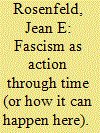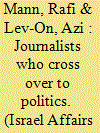| Srl | Item |
| 1 |
ID:
152877


|
|
|
|
|
| Summary/Abstract |
The purpose of this paper is to discuss how fascism may be identified by its actions, the stages through which a fascist rule takes power, and how to recognize it before it does so. The thesis is that a fascist takeover of a democratic government is rapid and unexpected. Its goal is a revolutionary reversal of representative government in the name of the people, while it accomplishes the opposite: a single-party corporate regime that replaces individual liberty with subtle, bureaucratic, and overt types of coercion. Rather than generate a generic definition of the many types of fascism, it is more useful to study how it affects the lives of ordinary people, the milieu out of which it develops, and what its precursors look like. Understanding fascism entails studying it from the point of view of those who lived under it and recorded their experiences, as well as from the analytic perspectives of social scientists. As Robert O. Paxton observes: “The fascist phenomenon was poorly understood at the beginning in part because it was unexpected.”1Robert O. Paxton, “The Five Stages of Fascism,” in Fascism: Critical Concepts in Political Science, edited by Roger Griffin, vol. I (2004), Chapter 14, 305–26.
View all notes
We are facing the question again in 2017 with the surprise election of Donald Trump as the forty-fifth president of the United States by a minority of the popular vote and the evident support of the white nationalist milieu. Paxton proposes a five-stage theory for understanding fascism in its many varieties. A developmental sequence is proposed against which current events in the United States may be assessed.
|
|
|
|
|
|
|
|
|
|
|
|
|
|
|
|
| 2 |
ID:
158165


|
|
|
|
|
| Summary/Abstract |
The crossover of journalists to politics is not a novel phenomenon, but in Israel it has intensified in recent years with the increase in the number and the name recognition of the journalists who make the transition. Why do journalists make the transition to politics? Do they make an effective use of their media skills, and how do they perform as parliamentarians? To address these questions, semi-structured interviews were conducted with parliamentary reporters ‒ the main link between parliamentary affairs and the media.
|
|
|
|
|
|
|
|
|
|
|
|
|
|
|
|